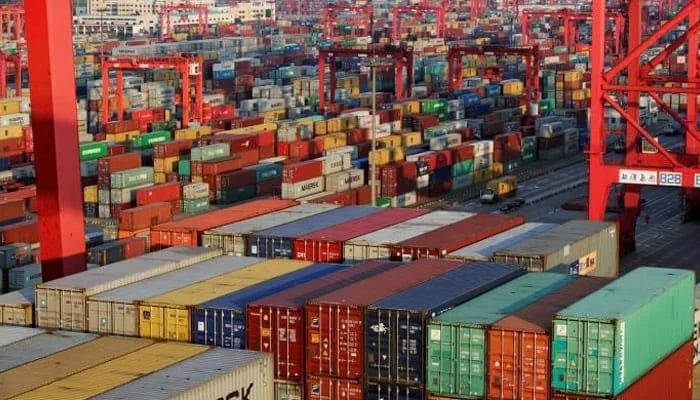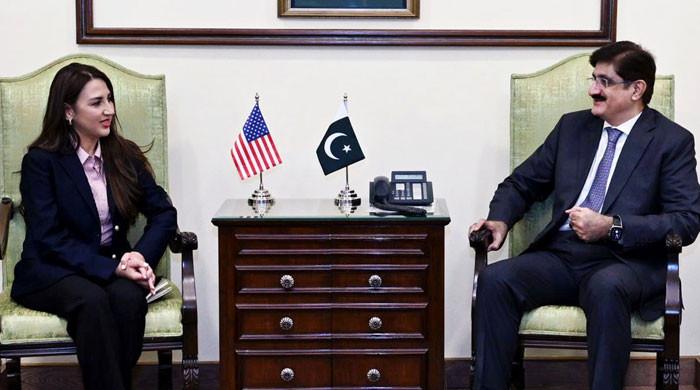USTR report links Pakistan's internet restrictions, Peca law to trade barriers
Report states US companies cited concerns that Pakistan imposes high tariff rates on products such as automobiles and finished goods
April 05, 2025

The United States Trade Representative (USTR) has released its annual report on foreign trade barriers, listing Pakistan's trade and investment policies, internet restrictions, and corruption, among other issues disrupting commercial operations.
The Office of the USTR issued the 2025 National Trade Estimate Report (NTE) two days before the Trump administration rolled out reciprocal tariffs. It is the 40th report in an annual series that highlights significant foreign barriers to US exports, foreign direct investment, and electronic commerce.
The day was termed “Liberation Day” by Trump, who signed an executive order imposing a flat 10% tariff on almost all nations and then additional tariffs on those countries that the US accuses of charging higher levies on American goods.
The Trump administration imposed a 29% tariff on Pakistani imports, in addition to a 10% baseline tariff applied to all imports, bring the total tariff on Pakistani products to 39%.
In his remarks, President Trump said, "Pakistan has been charging us a 58% tariff on our goods. Hence, we are imposing a 29% tariff on their products."
The USTR report divided trade barriers into multiple categories, including import policies, technical barriers, service barriers, and electronic commerce.
The report mentioned that Pakistan routinely blocks access to Internet services for hosting content deemed to be blasphemous or immoral, or on grounds that such services can be used to “undermine national security.”
"Under the Prevention of Electronic Crimes Act (Peca), Pakistan routinely blocks entire social media platforms or demands that sites geo-block posts considered unlawful online content.”
An e-Safety Bill and the pending establishment of a Digital Rights Protection Authority and National Center for Cyber Investigations would increase financial and criminal penalties associated with online speech, it noted.
"Pakistan has repeatedly suspended access to mobile data and certain online services in major cities in response to planned protests, large-scale demonstrations, and other perceived unrest. These suspensions undermine a free and open Internet and impede trade in the digital economy by restricting access to information and services and disrupting commercial operations. The US continues to monitor the impact of these events on US trade and investment, including services exports," it concluded.
According to the report, US companies have cited concerns that Pakistan has been imposing high tariff rates and, in some cases, additional duties, on products such as automobiles and finished goods.
The report also stated that US exporters in Pakistan face non-uniform customs valuation, excessive documentation requirements, and penalties due to outdated invoicing rules, adding compliance burdens.
“US companies have reported being adversely affected by Customs Rules 389 and 391. Customs Rule 389 requires the placement of a physical invoice and packing list in the shipping container, while Customs Rule 391 places the responsibility of including such documents, and liability for failure to comply, on the owner of the goods and the carrier.
“Such rules pose compliance challenges for companies that use intermediaries, re-invoicing, or the storage of goods at various points during transit,” read the report.
It said that US companies face foreign exchange restrictions and bureaucratic hurdles in Pakistan, making it difficult for them to repatriate profits and dividends, “generally coinciding with the government’s focus on stemming outflows of US dollars.” However, conditions improved in 2024 “as Pakistan’s balance of payments position stabilised”.
The report added that US companies have experienced increased pressure from the Federal Board of Revenue (FBR), Pakistan’s tax collecting authority, to prepay anticipated tax liabilities and “have expressed concern that many of their local competitors still do not pay taxes at all or engage in tax evasion”.
“The US government has repeatedly engaged with the Pakistan government on issues involving unfair and disproportionate taxation of US companies and continues to reinforce the importance of Pakistan broadening its tax base,” it said.
The report revealed that Pakistan remains on the US Special 301 Watch List due to weak Intellectual property (IP) enforcement, rising counterfeiting, and inconsistent rulings from IP tribunals.
“Although Pakistan has made gradual improvements toward better coordinating its IP enforcement efforts and updating its IP laws, serious concerns remain, particularly in the area of IP enforcement,” it said.
Moreover, the report addressed the contentious issue of Pakistan’s technical barriers in the packaging and labeling of imported food products, particularly vegetable oils. US exporters have faced significant challenges due to Pakistan’s stringent halal certification requirements and its 66% shelf-life rule, which continue to create uncertainty and operational difficulties for businesses.
Furthermore, the report stated that US companies also found corruption and a weak judicial system as “substantial disincentives” to foreign investment in Pakistan.











